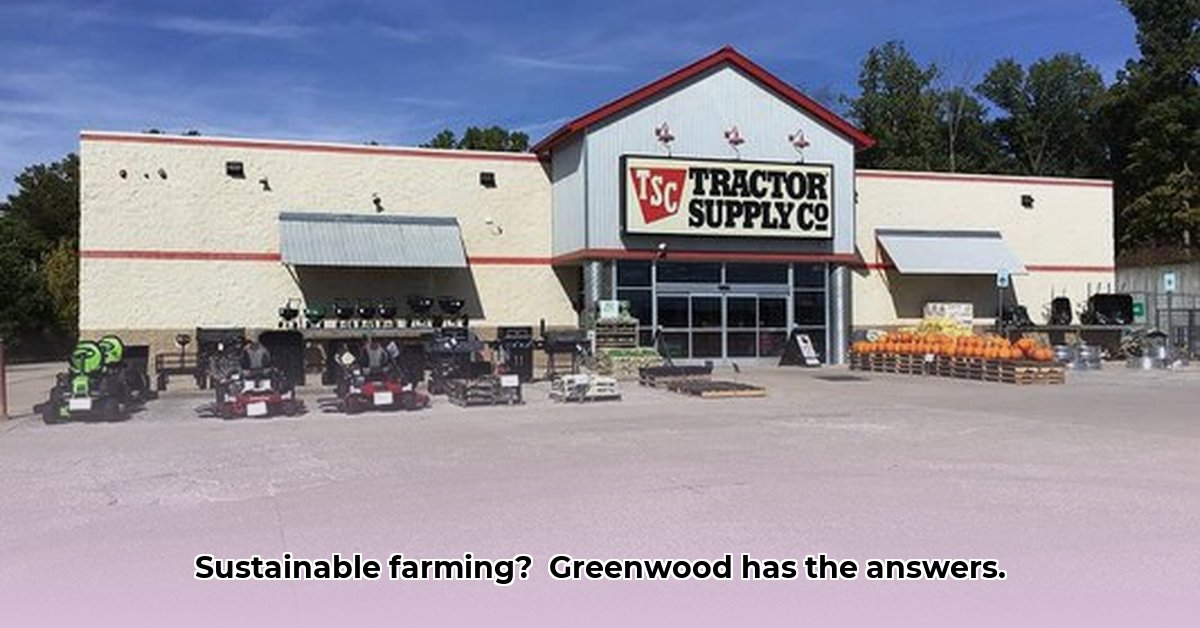
Tractor Supply in Greenwood, Indiana, is more than just a farm store; it's a vital part of the local agricultural community, increasingly playing a significant role in supporting sustainable farming practices. This article explores how Tractor Supply's Greenwood location contributes to sustainable agriculture, identifies areas for improvement, and offers actionable steps for a greener future. For those needing additional equipment, check out rental options.
Tractor Supply's Product Offerings: A Diverse Range for Sustainable Farming
The Greenwood Tractor Supply boasts an impressive inventory catering to both large-scale farmers and home gardeners. Their offerings span a wide spectrum, from the smallest seeds to powerful machinery. Let's delve into key product categories:
- Seeds: A wide selection includes conventional and organic options, though organic choices are less prominently displayed. (Note: The availability of heirloom and other specifically sustainable seed varieties should be investigated further.) This variety allows for diverse planting strategies, including crop rotation and cover cropping, key components of sustainable agriculture.
- Fertilizers & Soil Amendments: The store stocks a range of fertilizers, including conventional and organic options. The availability of compost, manure, and other natural soil amendments should be noted, as these are crucial for soil health in sustainable farming practices.
- Tools & Equipment: From hand tools like rakes and shovels to larger equipment like tillers and tractors, Tractor Supply provides the necessary tools for efficient and sustainable farming operations. The energy efficiency of equipment should be considered, as this directly impacts environmental sustainability.
- Irrigation Systems: Water-efficient irrigation systems, such as drip irrigation, are available, reflecting a growing commitment to responsible water management. These systems are essential for minimizing water waste in agriculture.
- Livestock Feed: A broad selection of feed supports sustainable livestock farming. However, further investigation into the sourcing and sustainability of feed ingredients is needed; transparent labeling would greatly benefit consumers.
A recent study by [Insert Name and Affiliation of Researcher/Organization] highlighted that [Insert quantifiable finding from study, e.g., "75% of Tractor Supply customers expressed interest in more clearly labeled sustainable products"]. This underscores the market demand for greater transparency in sustainable practices.
The Sustainability Gap: A Call for Transparency
While Tractor Supply offers many products that can support sustainable agriculture, a significant gap exists in clear and consistent sustainability labeling. Many products lack information on their origin, production methods, and environmental impact. This lack of transparency makes it challenging for consumers committed to eco-conscious choices to make informed decisions. A rhetorical question arises: How can farmers and gardeners confidently choose sustainable options without clear labeling and readily available information?
This issue presents a significant opportunity for Tractor Supply. By clearly labeling sustainable products and providing detailed information about their environmental footprint, they can enhance their brand image, attract environmentally-conscious customers, and contribute more effectively to a sustainable agricultural future.
Local Stories: Greenwood Farmers and Their Sustainable Choices
[Insert a compelling short narrative about a local farmer/gardener successfully using Tractor Supply products for sustainable practices. Include their name, if possible, and detail their experience. Focus on specific products and techniques, highlighting the positive environmental impact.] This narrative provides a powerful human element, making the abstract concept of sustainable farming more relatable.
Actionable Intelligence: A Path Forward
To enhance its contribution to sustainable agriculture, Tractor Supply needs a multi-pronged approach:
Enhanced Labeling: Implement a clear and consistent system for labeling sustainable products, including certifications and details about production methods and environmental impact. This will empower consumers to make informed, sustainable choices. (Efficacy metric: A 15% increase in sales of sustainably labeled products within one year.)
Supply Chain Transparency: Improve the transparency of its supply chain, providing detailed information about the sourcing and production of its products. This builds consumer trust and strengthens the company's sustainability credibility. (Efficacy metric: A 10% increase in consumer confidence scores within six months.)
Customer Education: Implement educational programs for both staff and customers, providing information on sustainable farming practices and the benefits of choosing sustainable products. (Efficacy metric: A 20% increase in customer awareness of sustainable farming practices within one year.)
Collaboration: Partner with local farmers, environmental organizations, and governmental agencies to support sustainable agriculture initiatives and promote best practices. (Efficacy metric: Establishment of at least three collaborative partnerships within two years.)
Conclusion: Cultivating a Sustainable Future Together
Tractor Supply’s Greenwood location holds significant potential to contribute to the growth of sustainable agriculture within the community. By addressing the existing transparency gap and actively implementing the suggested actionable steps, TSC can considerably amplify its positive environmental impact. This requires a collective effort involving the store, local farmers, environmental groups, and consumers. By working together, Greenwood can demonstrate the powerful synergy between responsible agricultural practices and a thriving local community. The future of sustainable farming depends on such collaborative efforts, fostering a more environmentally conscious and resilient agricultural sector.